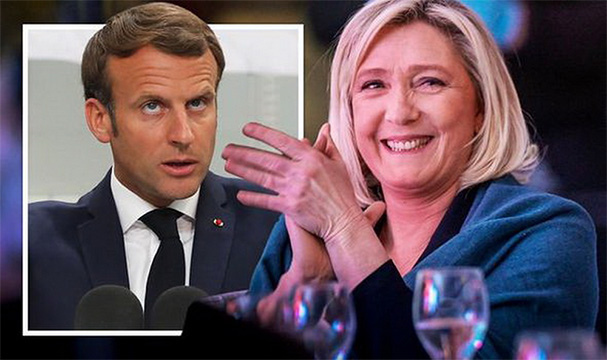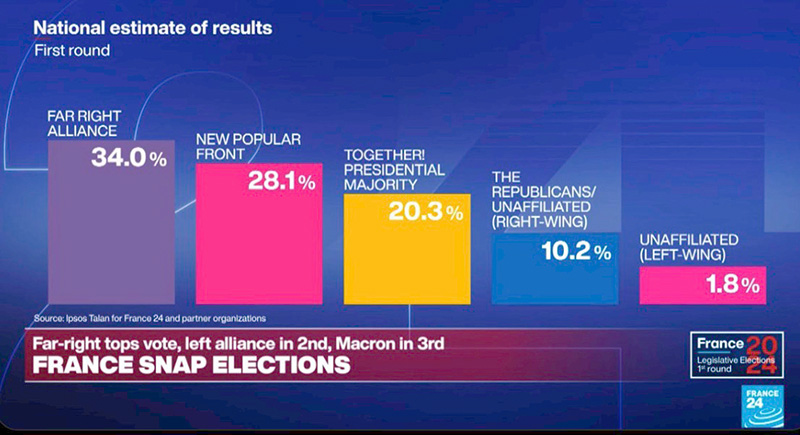
Emmanuel Macron faces a bitterly painful choice: Throw everything he’s got at stopping the far right, or try to save what remains of his once-dominant movement before it dies, notes POLITICO.
For the 46-year-old leader of France, Sunday’s first-round parliamentary election was a humiliation every bit as personal as his stunning rise to the presidency as a fresh-faced outsider seven years ago.
He called the snap vote, after a disastrous defeat at the hands of the far right in June’s European election, with one aim in mind: to halt France’s lurch to the extremes in its tracks. He achieved the opposite.
Europe’s second-biggest economy and the EU’s only nuclear-armed power is now closer than ever before to ushering in a far-right government for the first time, after Marine Le Pen’s National Rally (RN) took a dramatic lead in the first stage of voting.
If the second-round vote on July 7 delivers a parliamentary majority for the National Rally — and forecasts suggest it’s possible — France will be in uncharted waters: The country would be governed, at least in part, by politicians who made their names sympathizing with Vladimir Putin while vowing to rip up the European Union, wage war on migration and quit NATO.
Although Le Pen’s party has softened some of its sharper-edged positions, it remains deeply skeptical of Western mainstream political positions. A victory in this election would provide a powerful boost to her chances of winning the French presidency in 2027.
“We can say with lucidity that the detoxification of the National Rally is reaching its final stages,” said Bruno Cautrès, a political analyst with Sciences Po institutes.
“They won the European election three times in a row and Marine Le Pen twice got through to the second round of the presidential election; if they win France’s second-most-important election [the parliamentary election], they’ve become mainstream,” he added.
According to analysis from the Ipsos polling institute, Le Pen’s party’s projected results put it within touching distance of power. Her party got 33.2 percent of the vote in the first round, meaning the far right could get between 230-280 seats in parliament, according to the institute.
With the threshold for commanding an absolute majority in parliament is 289 seats, the far right may even be in a position to form a government in a week’s time, with 28-year-old National Rally President Jordan Bardella as its prime minister.
The question now is whether anything, or anyone, can stop it.
How close Le Pen gets to an absolute majority depends on how other parties, and Macron, react to her resounding victory. Do they put their differences aside and unite to beat the far right?
The parliamentary election is a complex, two-round process in which the two candidates who get the most votes in the first round go through to a second round. But in this crucial election turnout was high, and that meant that in up to an estimated 315 constituencies a third candidate, often someone from Macron’s “Ensemble” coalition, also qualified for the second round.
Ensemble candidates have been eliminated in half of France’s 577 constituencies. Macron’s centrist parliamentary group is set to shrink from 250 lawmakers to fewer than 100 in the National Assembly. Now his centrist allies face enormous pressure to pull out of the race in many areas and advise their supporters to vote for the left-wing alliance, which includes far-left radicals, in an attempt to beat Le Pen.
On Sunday, Le Pen insisted Bardella would only become prime minister if National Rally had the support of parliament. Traditionally, the French president nominates a prime minister from the largest parliamentary group in the National Assembly.

read more in our Telegram-channel https://t.me/The_International_Affairs

 11:57 01.07.2024 •
11:57 01.07.2024 •






















